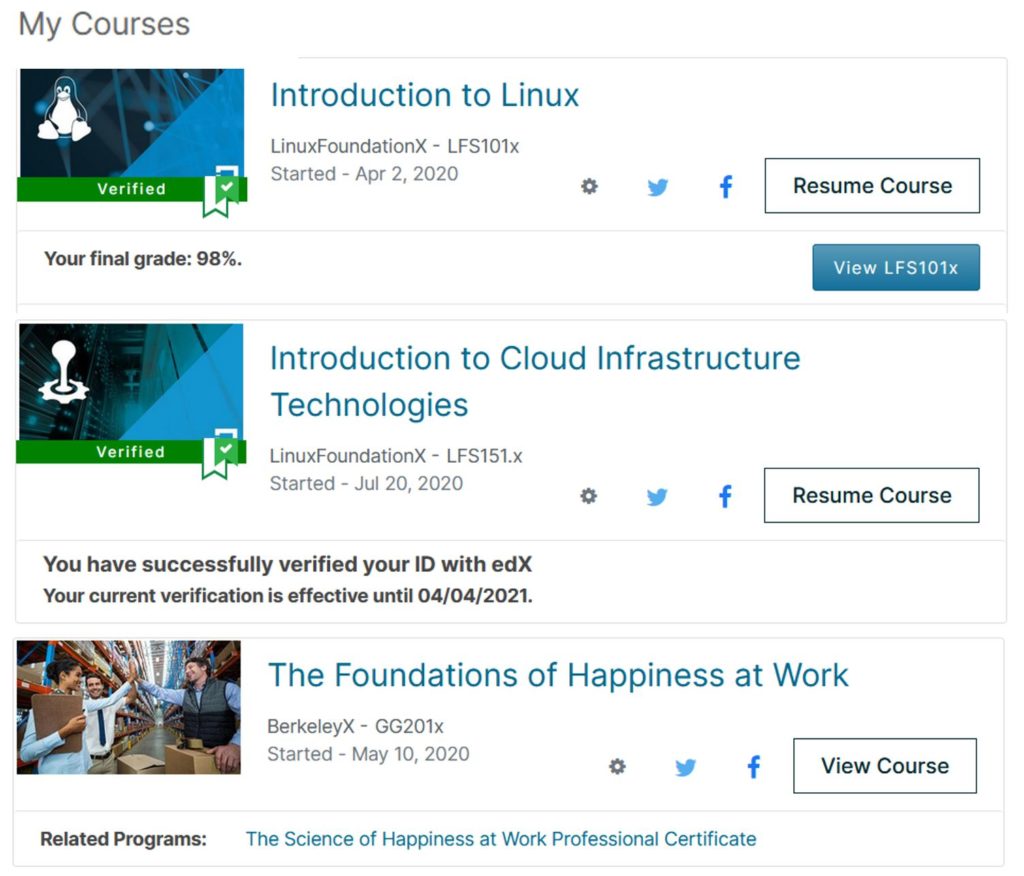I applaud the vast quantity of knowledge and trainings posted on the Internet lately. Knowledge is shared to whomever is motivated to learn.
No more excuses, as online trainings remove the location constraints. These days, the only requirement is an Internet connectivity. On top of that, many courses are free, which might remove another barrier for entry to some.
Do we all realize what it means? I can follow courses from the top universities in the world. As an example, an “Computer Science for Artificial Intelligence” course from Harvard university or “Different Equations” from MIT. Actually, about 2500 MIT courses are available online, thanks to the MIT OpenCourseWare. This is incredible! I’ve always been a strong a believer that acquiring knowledge makes you grow. As such, all this knowledge makes me dizzy: I’m tempted to attempt all courses but I would need to scale myself (either horizontally or vertically to make cloud analogy). Obviously, the COVID-19 pandemic, which reduces social activities and travels, frees up some more time to learn… if we want to try to put a positive spin to this situation!
In my mind, the biggest advantage of online trainings is actually the time flexibility. You study what you want, when you want, at your own pace. For example, I might spend hours on a very simple and short module because my interest went towards adjacent topics, which piqued my curiosity.
I’ve been learning from different sources, on different platforms, from foundational trainings to more leading edge ones, from formal training to podcast and blogs:
- Coursera. My very first Massive Open Online Courses (MOOC) trainings, in 2014, was a very professional “Introduction to Interactive Programming in Python” course by the Rice University. I liked such MOOC trainings with mutual assistance among students as we go through the same exercises at the same time, as lessons and practices are released on a weekly basis.
- EDX. Another MOOC platform with certification with an important advantage IMO: your ID is authenticated. So basically, it proves that me, myself, and I actually passed the certifications.

- While there are a few LINUX courses in EDX, these are the entry level ones so that you are redirected to yet another MOOC for other certifications, i.e. LINUX Software Foundation (LSF). So for a training such as “Kubernetes Fundamentals (LSF-258)”, I have to login (and pay) on the LSF platform.
- Cisco DevNet with a combination of reference material, learning labs, sandboxes, source code, and certifications… though arguably only for those interested in Cisco technologies.
- Some subscription based sources of courses and blogs/trainings, such as ipSpace.net by Ivan Pepelnjak, or Pluralsight. These sources of information are interesting, but highly dependent on the professionalism, expertise of the individuals, along with the frequency of updated content. Note: I subscribed to Pluralsight, based on Nicholas Russo’s plan Cisco Certified DevNet Associate (DEVASC) – Comprehensive Study Plan – YouTube. Indeed, pushing a lot of courses online is one step, what is really important to me is the organization of all this knowledge.
- Podcasts such as the famous PacketPushers or networkcollective: not necessarily courses but panel discussions among renowned experts.
And obviously, there are more training sources, such as LinkedIn learning or even the Google Career Certificates obtainable in about six month … instead of traditional university degrees in years.
So clearly the world of education, training, certifications is clearly changing. And that’s a clear opportunity. Now, reflecting on this world in transition, let me address two important points in my mind
- As a consumer of all this knowledge, what is the perfect MOOC (platform) for me? What are the important MOOC features?
- The challenge of organizing all this knowledge
My MOOC Requirements
- A single platform, as opposed to a multiplicity of platforms. “A single one/platform to rule them all” is difficult, as trainings & certifications is a business of its own. Therefore, my requirement is a way to consolidate the information from different MOOC sources.
- Personally, I like trainings with certifications: they provide the little positive pressure to make you learn, on top of demonstrating you went the extra mile to study, as opposed to browsing a course.
- A MOOC platform authenticated with verified ID.
- Independent of my employer. Indeed, I don’t (solely) rely on my employer trainings. I’m responsible of my own faith in terms of knowledge development. However, adding my employer-paid certifications to the single platform aforementioned is ideal.
- A single link (typically, a LinkedIn-like pointer), which I could share IF NEEDED. I don’t specifically want to overload LinkedIn with a message each time a certification is passed. No doubt there is some sort of pride to succeed a certification but, after seen the following message a hundred times lately, I don’t feel like adding more of it.
The Challenge of Organizing the Knowledge
Attending courses is great but applying the knowledge is better: non only it ensures that the knowledge will be mastered, but maybe more importantly, that it will not evaporate with time … such as a foreign language you learned at school but never practiced. So picking up the right course topics at the right time is important.
However, from time to time, you don’t apply your new acquired knowledge directly during your daily projects. Here comes my biggest challenge: how to organize all this knowledge, which you will need one day … but not today. Do you save videos and PDF’s to your PC? Well, it’s a good start but not sufficient. Btw, it’s assuming that the PDF is available. See my exchange with an EDX teacher:
I almost completed the course. Very happy with what I learned. However, while this course is great to learn and to get a certification, the course should be improved in one dimension (absolutely required for me): become the reference material. I mean: I want to ability to search the course for something I learned, something I tested, something I studied .. for something I’m sure is in the course.
A single PDF would be great. If not possible, an efficient search within the course, on EDX. Whatever …
If you want MOOCs (and in particular EDX) to present of a view of my knowledge, go extra mile and allow to search through it. Without that functionality, we’re back to stackoverflow for reference…
The answer was … , well, as expected:
I understand the desire for indexing, searching etc, and would welcome it. However, this is not available on the edX platform — it is not a design feature of this particular course, so I feel your pain. Not much we can do about it 🙁
Resorting to screenshots for your notes is not even useful since the final document is unsearchable.
So, here is maybe the most important requirements for MOOCs to be useful, on top of the list aforementioned:
- The ability to annotate my course notes, with personal notes, with code excerpts, with link to my (github) projects, with pointers to material within different trainings, with included screeenshots, with action items, …
- … in a way that is easily searchable for later retrieval. And obviously, I want my notes to remain available for years.
In other words, I want the training I’m following now to become my reference material, automatically.
As a typical example today, I’m refreshing my python knowledge with a course. I enjoy this course, but it’s a video-only one. What will remain in the end? Some knowledge captured on the fly, the bookmarked URL with the course ToC, and some code snippets/exercises somewhere in my VM. Not sufficient to me. I followed a Kubernetes training in December and the “knowledge capture on the fly” evaporates quickly. Maybe I’m getting too old and I need to optimize how I classify my knowledge, as opposed to optimize my memory … but that’s a different topic 🙂
New business models are slowly emerging in the world of education. Who’s going to build me a MOOC-as a Service, with the above criteria? Obviously, General Data Protection Regulation (GDPR) must be respected … so I’m ready to pay a little for this, not to be the product.
Note: A potential promising component might be Solid: I’m dying to see what Sir Tim Berners-Lee’s Inrupt will come up with and whether they will tackle that issue.



Permalink
Indeed, excellent post with quite an interesting final word stating: “Posted in Uncategorized” J